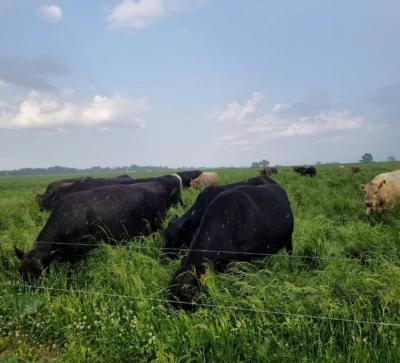With the help of the Natural Resources Conservation Service through the Environmental Quality Incentives Program (EQIP), Hunter Strebig made his dreams of turning his grandfather's farm in Outagamie County into a successful and sustainable beef cattle operation a reality. EQIP funding through the GLRI helped Hunter convert row-cropped land into managed rotational grazing, achieving water quality benefits from reduced erosion and nutrient losses. Managed grazing can provide a healthier plant community, decrease erosion and runoff, better livestock health and performance, and reduce costs to the landowner.
“Rotational grazing benefits both our cows and the land. Carefully managing the pastures helps us ensure the cattle are eating quality forage, which leads to high quality meat,” said Hunter.


